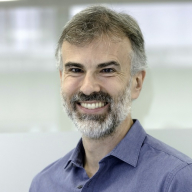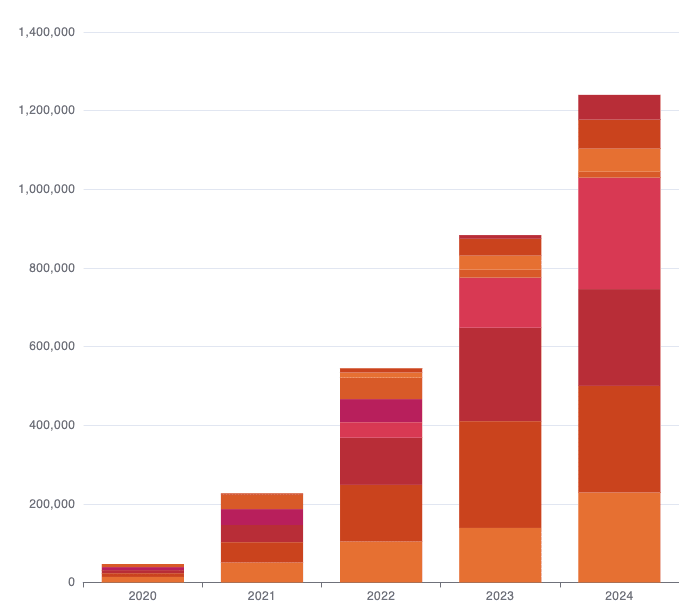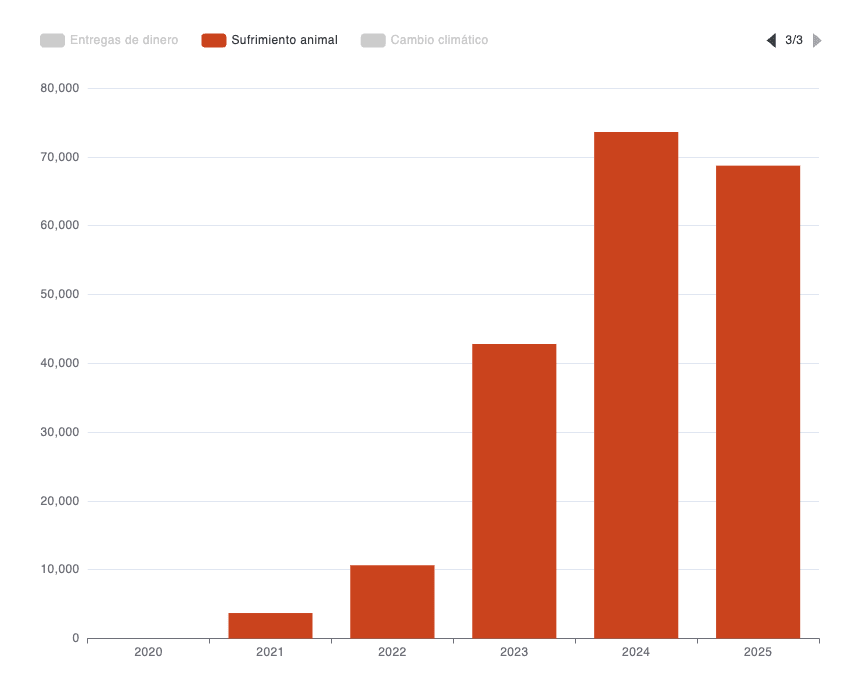
Pablo Melchor 🔸
Bio
Pablo Melchor, co-founder and president at Ayuda Efectiva. Co-founded EA Spain.
Posts 5
Comments41
My standard reply when people ask me how Ayuda Efectiva is going is "happy but not satisfied". I am happy because the trend is good. This is money raised for effective charities:

I am not satisfied because our figures are still tiny and I would like to see at least an extra zero to the right.
I expected this to be a very hard endeavor and I told my board from day one that we were starting a long-distance race. I would therefore say that things are going more or less as I could have wished for. (Note: I think figures are a great a progress indicator but a bad, random threshold for success)
My advice for founders of effective giving orgs is always that this is not about the donation platform but about how you acquire new donors. In my experience, the key is how you spread the ideas that lead to giving.
As I hinted at before, I am not a fan of the earning ro give concept and I much prefer an "earn and give" framing that recognizes that your income serves multiple purposes. Having said that, I do think that effective giving has a much larger role to play than it has today.
Striving for The Most Impactful Career is great when it works but extremely frustrating when it doesn't. Adding giving to the equation expands your space of possibilities dramatically.
As for starting for-profit startups, it is definitely an interesting option. I think the main considerations are the ones applicable to anyone contemplating entrepreneurship: the odds are against you and building something from scratch can be extremely hard, so you should only do it if you REALLY want to do it—often for hard to explain reasons.
Thanks for the hot take, Camille :-). My slightly colder take is that how impactful my book ends up being (anywhere from very much to very little) will be a valuable data point for EAs in other non-English-speaking countries.
As for what limits the reach of EA ideas in these countries, I think (a) there may be some truth spread across the different theories and (b) the disagreement needs to be operationalized by making the goal concrete. If your goal is to find the nerds* with the highest potential for global impact, they probably spend hours reading online content in English and will discover EA pretty much as if they were staring at their laptop in California. However, I believe there is a huge counterfactual impact to be had beyond that demographic.
I see effective giving in particular as an undervalued way of making impact accessible to a much broader audience, and hence my book. This seems like a good place to drop something I think about often: I almost never talk about "earn to give", since I'd much rather suggest that people "earn and give".
* No negative connotation implied: I embrace my own nerdiness.
Thanks for the question, Pablo.
Beginning with Ayuda Efectiva, when we launched we had to decide how to approach what I would call a tough market: not much of a giving culture, low trust, and a still very traditional culture in certain aspects. I think that when you enter a market like that, your strategy must be wedge shaped. In our case, the tip of the wedge was making people consider whether they should give a part of their resources to help others. The wedge widened with the introduction of an effectiveness mindset and spatial impartiality (as referred to humans): two huge asks already. We felt—I think rightly—that introducing the expansion of the moral circle to include non-human animals was just too much at that stage.
However, we are gradually introducing cause areas beyond global health and poverty. @Andres Jimenez Zorrilla 🔸 nudged us to start offering an animal welfare option in 2021 and this is the progression so far.

The figures are small compared to GHP, but the trend is significant. All this is to say that having multiple cause areas was not an "if" but a "when" decision.
As for the book, I hope you won't mind my self-quoting from the announcement 😁:
The truth is I’ve written the book I realized I wanted to write.
Back in 2018, discovering that I could help thousands of people and save lives at little personal cost was a forceful intellectual and moral shock, as well as a happy turning point in my life. It seems obvious in retrospect, and it’s not something that keeps people busy at the expanding frontiers of EA. However, out in the world, it is a powerful idea that millions of people should hear. If it’s well explained, it can change the minds and behaviors of a certain fraction, resulting in an extraordinary impact. I see my book as a modest contribution to that project, focused on the currently neglected Spanish-speaking world.
Many books try to do too much. They gain pages and lose strength. I decided to focus on a single idea (“You have the power to save lives”), explain why it is true and meaningful, and remove anything that did not help to make the case.
Great to hear you're working on a book!
I think you have it right: promotion is at least half of the workload.
@Matt Coleman🔹 gave me the words to describe myself as an "outgoing introvert". I often crave some more "cave time" but I know that putting myself out there is a must. As is the case for other public(ish) EA figures, podcast interviews have been key for me. In the case of the book, the publisher wouldn't have reached out to me if I had not already built a modest public presence.
Moving to your specific questions:
- Promoting the book has been my single priority since ˜May, when we started to plan the launch, and will be at least until the end of October.
- No NGO collaborations. My relationships (and, by now, friendships) with podcast hosts and YouTubers are key. I have not tested collaborations with other influencers, mostly because my hands are already full :-).
- I already have experience with TV and radio appearances so I am not investing in media training, but I think it can be a great investment and I hear wonders from other people in EA who have done it.
- I am doing launch events in Madrid, Barcelona, and Valencia, but I see them as a nice thing to do with "fans" (for lack of a better word) rather than a key outreach initiative. You simply reach many more people through things like podcast interviews. People who have worked on EA book launches, like Abie Rohrig, stress this as well.
The "Pablo" effect is definitely worth studying :-). Besides your being the OG EA Spanish-speaker, there was a time when EA Spain was known as "Jaime (@Jaime Sevilla) and the Pablos". We still dominate the first-name leaderboard and have cool regional variations like "Pau".
Thanks a lot or your comment: I am really fortunate to have found a way to put my comparative advantage to good use. My life satisfaction is way higher than before because of EA.
Good question. There can be many synergies between EA communities and effective-giving orgs but, as for where to start, the people involved—and their comparative advantages—matter a lot.
Building Ayuda Efectiva has been hard but still comparatively easy for me because I already had the entrepreneurial experience, the connections to raise seed capital locally, certain communication skills, etc. Conversely, I would have been the wrong person for the aim of starting student groups in Spanish universities.
People thinking of starting effective-giving orgs in countries without strong EA communities should be aware that setting the org up and having a website to accept donations is worth very little—even though it may require a lot of work. Outreach is essential. It is hard and it takes time: do not expect quick results.
I do think it is an essential communication skill to meet people where they are at before you ask them to follow you to a different destination. In some countries, giving is part of the culture. In Spain, you have to start at "why give?", and work through a lot of trust issues before you get to effectiveness. The public perception of NGOs is quite bad and acknowledging there are reasons for that is often an important starting point.
You also have to consider that there are very different profiles within the same country. My conversation with a young, politically liberal, agnostic entrepreneur may be very different from that with their seventy-year-old, conservative, Roman Catholic father (by the way: the liberal-conservative spectrum can flow in different directions in each country).
If I compare my Spanish-language book to other EA-themed books in English, the most salient difference may be that I devote a lot of pages to questioning the bad arguments for dismissing charitable giving as a whole.

Answering the questions in the OP:
How influential are the most prominent EA intellectual figures in the Spanish-speaking world?
The short answer would be "not much" :-). Peter Singer is of course known in academic philosophy circles and he has received some recognition. Toby Ord is not well known and Will MacAskill is mentioned most often by a couple of hatchet-job-specialized journalists that present EA as some crazy cult that aims to destroy the world (or something along those lines: I ignore their "work" since I realized I gained nothing from reading it).
What’s distinct about the giving culture in Spain?
Probably that there is not much of a giving culture. The first €250 you give has an 80% tax deduction, costing you just €50. The average yearly donation doesn't even reach that €250 amount. However, the average Spaniard is not the person we are targeting. I have often found our donors to be not people who were already giving and decided to do it more effectively, but rather people who were very skeptical of the existing alternatives and who started giving significantly upon discovering effective giving.
What surprised you about writing your book?
Lots of things! The many gaps in my reasoning; how the core idea emerged while writing; how much clutter you can remove; how writing improves your thinking; how generous, helpful and supporting my beta readers were...